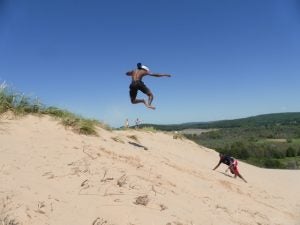Earth Camp is partnering with University of Michigan’s Wolverine Pathways for 2022 and will not be accepting outside applications.
All-virtual option for rising 10th grade: Monday, July 11 – Wednesday, July 20, 9am-12pm M-F
This virtual camp will focus on environmental science of The Great Lakes, with laboratory, Google Earth, environmental justice, data analysis, and individual project components. The goal of this virtual camp is to learn through hands-on experiments and analyzing real data, rather than being “talked at” via Zoom.
The laboratory component of the course will have students conduct experiments with supplies mailed directly to them. What happens when you create a sulfur-rich atmosphere void of oxygen? What happens in a world with an acidic ocean? You will find out when you create enclosed, miniature “Earth systems” while varying the water and atmospheric conditions using different chemicals. What does the mineral sulfur smell like? What chemical reaction causes calcite to “fizz” when you put a drop of acid on it? What does the mineral halite taste like? You’ll be sent your own rock and mineral set to find out. There will also be a CSI unit using stable isotopes – a tool many earth scientists use. You will send in a sample of your pet’s hair, your hair, or your favorite food and they will be run through a machine on campus called a mass spectrometer. The results will be used to solve our own “crime scene investigation”.
Additionally, students will spend time using Google Earth to travel around Michigan and explore many natural wonders along our Great Lakes coastline. Our final class project will be to make a class presentation on “where we want to travel in the Great Lakes region and why once Covid restrictions are lifted”
Each student will also be responsible for contributing to a group project. For instance, one group might choose to investigate the Flint Water crisis. Where and why did it happen? Everyone knows it happened in Flint, but you will create a Google Earth presentation that could show: Where is the river that was the old drinking water source and where is the new drinking water source? What is the chemistry difference between the two that caused the spike in lead in the water? You will all have a mineral in your rock and mineral kits made of lead (called galena), but this isn’t dangerous to you to touch (or lick!), but what is it about the Flint water that made lead pipes suddenly turn toxic? Issues like this will be chosen and explored deeper within each group for your final project.
Lastly, you will be taught by current undergraduate and graduate students in the Earth and environmental science department, with various faculty members stopping in to say hi and see what you are working on.
In-person Earth Camp is July 20-26th
Earth Camp is a residential program. Students will stay in dorms on campus and in hotels when traveling. Students will need to provide transportation to and from Ann Arbor at the beginning and end of the session – although if this is a problem, our staff can help with transportation.
Earth Camp is a 3-summer-long program. The first summer, for current ninth grade students, takes place at the University of Michigan, Ann Arbor campus and Sleeping Bear Dunes National Lakeshore. The second summer takes place on Mackinac Island, Pictured Rocks National Lakeshore, and Marquette and Houghton, Michigan. The third summer takes place in Wyoming at Grand Teton and Yellowstone National Parks. Students must complete the first summer of Earth Camp to be eligible for the next two summer experiences.
 Our first summer of Earth Camp is open to current 9th grade students, who will be entering 10th grade Fall 2020. This week-long experience takes place at the University of Michigan and Sleeping Bear Dunes National
Our first summer of Earth Camp is open to current 9th grade students, who will be entering 10th grade Fall 2020. This week-long experience takes place at the University of Michigan and Sleeping Bear Dunes National
Lakeshore. Thanks to the generosity of our sponsors, there is no cost to attend Earth Camp.
Activities include:
- The ropes course at the University of Michigan Challenge Program
- Water quality studies in local rivers and ponds, followed by kayaking the Huron River
- Fields trips around the Ann Arbor area exploring our glacial features and sedimentary geology
- Building solar cells
- An overnight visit to Sleeping Bear Dunes National Lakeshore
- Geocaching
- A weather balloon launch
For more information about Earth Camp Summer #1, please check out our blog posts from previous summers here.
Questions? Contact earthcamp@umich.edu (we encourage applicants, as opposed to parents, to contact us if they have questions about Earth Camp or the application process)



